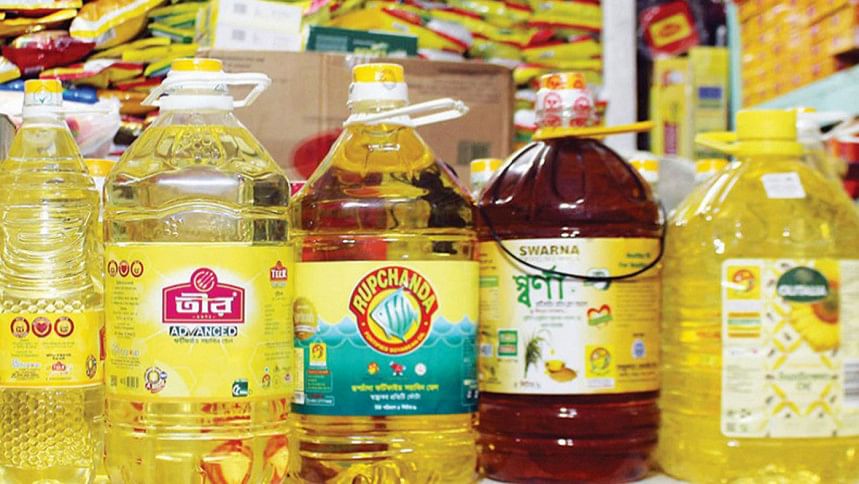Soybean oil at Tk 110 a litre for TCB cardholders

This time the government is trying to import edible oil directly through the TCB, Senior Commerce Secretary Tapan Kanti Ghosh said
The Trading Corporation of Bangladesh (TCB) will resume selling soybean oil at Tk 110 a litre to one crore TCB cardholder families from next month, Senior Commerce Secretary Tapan Kanti Ghosh said yesterday.
"We are procuring edible oil from local and international markets to sell at lower prices as the domestic prices have gone up thanks to a hike in global crude edible oil rates," Ghosh told The Daily Star.
This time the government is trying to import edible oil directly through the TCB, he said.
Bangladesh foreign missions have already been contacted for procuring edible oil through the state-run corporation, Ghosh also said.
"This time the price may be little higher than the previous rate of Tk 110 a litre because of a rise in its local rates."
"The price is not fixed yet. But we will try to fix it at Tk 110 a litre for bottled oil," the senior commerce secretary also said.
The TCB cardholder families have been provided with edible oil at Tk 110 a litre for a month before the Eid-ul-Fitr.
Moreover, the open market sale of oil along with few other basic commodities by the TCB will restart through 400 trucks in Dhaka and other divisional cities in the middle of May, Ghosh said.
"We will hold a meeting with the refiners, millers and wholesalers of edible oil on May 9 or 11 to know the situation of stocks, imports and global market of edible oil."
Last month, the commerce ministry requested the National Board of Revenue (NBR) to cut import duty on canola, sunflower, and olive oil to 10 per cent from the existing 32 per cent by July this year to boost their imports.
The current market situation is so volatile that the ministry may ask the NBR to implement the duty cut by this month, he added.
The commerce ministry has been trying to bring in palm crude edible oil from alternative sources like from Malaysia and the USA as its main producer Indonesia banned export of its refined and crude versions from April 28.
Bangladesh has been foreseeing a supply crunch of edible oil with the proposed export ban as the country sources 85 per cent of its annual requirement of 11 lakh tonnes of crude palm oil from Indonesia.
The government hiked bottled edible oil prices by Tk 38 a litre and the loose ones by Tk 44 a litre with effect from May 6.
A litre of bottled soybean oil is sold at Tk 198, up from Tk 160, and the loose oil at Tk 180 a litre, up from Tk 136.
The government increased the rates based on the base price of imported crude oil at $1,750 a tonne, up from the previous rates of $1,400 for soybean oil and $1,300 for palm oil, Ghosh said.
Earlier on March 16, the government reduced the value added tax on import of soybean and palm oil to 5 per cent from the previous 15 per cent.
Bangladesh monthly needs around 1.67 lakh tonnes of edible oil and the demand rises to around 3 lakh tonnes during Ramadan.
Only 2 lakh tonnes out of the country's annual demand of 20 lakh tonnes of edible oil come from local production and the rest from imports.
Bangladesh annually imports some 5 lakh tonnes of crude soybean oil and some 24 lakh tonnes of soybean seeds.
Around 4 lakh tonnes of edible oil are produced from the imported seeds, according to the commerce ministry data.

 For all latest news, follow The Daily Star's Google News channel.
For all latest news, follow The Daily Star's Google News channel. 








Comments